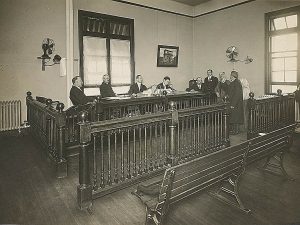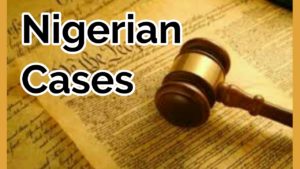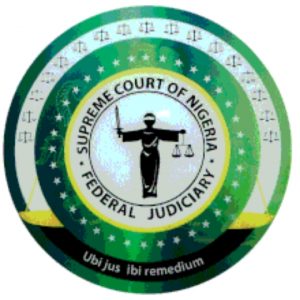Bronik Motors V Wema Bank: In this case, the issue of the parties’ liability in respect to an agreement led to the interpretation of a certain section of the constitution and that of the Federal Revenue Court Act. The question was as to the jurisdiction of the State High Court to hear banking matters arising from the banker/customer relationship which does not affect the federal revenue.

Recommended: 9 Essentials of a valid contract
Issues determined in Bronik Motors Ltd & anor V Wema Bank Ltd (1983) NGSC 10
a. The liability of a party to an agreement and that of the guarantor
b. The jurisdiction of the State High Court to hear and determine banking matters.

Recommended: Facts, Issues and decision of the court in Carlill v Carbolic Smoke Ball Co
Facts of the case of Bronik Motors V Wema Bank
There was an agreement between the plaintiff and the defendant to the effect that the defendant shall execute a legal mortgage in respect of certain properties somewhere in Yaba Lagos, Ibadan, Calabar and Aba. The legal mortgage was to serve as a security in favour of the plaintiff (Wema bank) for the overdraft of about 2 million naira extended by the plaintiff in favour of the defendant.
The defendant made his overdraft request to the plaintiff which they accepted and extended upon the condition of certain banking policies which necessitated some incidental extra charges as interests. The agreement that the defendant shall execute a legal mortgage as a security for the overdraft was evidenced in the letters written across by the parties.

Recommended: How to enter appearance in court
Moreso, asides having not executed the legal mortgage, the defendant had refused to comply with the payment of the overdraft upon several demands by the plaintiff (bank). The plaintiff thereon claims an interest of 8 percent rate per annum counting from October 1st 1979 till the defendant redeems the debt. The plaintiff sought the relief of the specific performance of the agreement in the High Court which was successfully granted in their favour.
Also see: Donoghue v Stevenson: Facts, Issues and decision of the court
Decision of the court in Bronik Motors V Wema Bank
The High Court ordered for specific performance of the agreement, that is, for the defendant to execute legal mortgage in respect of the agreed properties as was evidenced in their agreement. the High Court further granted the interest rate of 8 percent as was claimed by the plaintiff counting from the time before judgment, and then 4 percent interest rate counting from after the judgment until the debt in wholly paid. 500, 000 naira was also awarded against the guarantor (the second defendant) with the same rate of interest before and after the judgment.

Dissatisfied with the judgment, the defendants/appellants filed an appeal to the Court of Appeal. The Court of Appeal granted leave for the appellants to make certain amendments which though did not introduce new facts. While in the court of the appeal, a third party claimed ownership of the subject matter situate at Yaba, Lagos which was one of the properties agreed to be executed as a legal mortgage in favour of the plaintiff. This subject matter is among those which the High Court had ordered specific performance for legal mortgage to be executed in respect to it.
The Court of Appeal partly upheld the High Court’s order of specific performance but set aside the order in respect of the properties somewhere in Yaba, Lagos and Calabar as null and void. The appellants being dissatisfied went further to Supreme Court. The appellant raised the issue of jurisdiction in the Supreme Court. The court had no problem with this since the issue of jurisdiction is a so fundamental that as a notorious principle of law, it can be raised at any time in the proceeding.
The appellant challenged the jurisdiction of the court on the ground that the State High Court which heard the matter was not the appropriate court to do so. This contention was based on the provision of section 7 of the Federal Revenue Court Act 1973 which is the interpretation section, and also section 230 of the 1979 constitution.
Recommended: Countries with the Best Judicial system in the world
The interpretation of both sections obscurely suggests that it is the Federal High Court that has the jurisdiction to adjudicate upon matters related to banking. Section 7 of the Federal High Court Act also highlights matters which it has exclusive jurisdiction to hear to include inter alia, banking. It is noteworthy that the Federal High Court was formerly the Federal Revenue Court.
Supreme Court thereon made reference to the case of Jammal Steel Structures Limited V African Continental Bank¸ where there has been an interpretation of the sections in issue. The counsel to the appellants, Chief F.R.A Williams urges the Supreme Court to overrule itself on this already decided precedent and adopt the view of the minority judgment in that case which is a better view. Supreme Court refused this submission and still holds the majority decision in Jammal’s case to be a better view and the intendment of the law.
Supreme Court thereon applied the ejusdem generis rule to give meaning to the provision of section 7. The provision in its subsection (iii) read “banking, foreign exchange, currency or other fiscal measures” thus, the Federal High Court have exclusive jurisdiction in respect to the afore outlined matters. Supreme Court viewed that the word “measure” is to be attached to the other subjects, thus “banking measures, foreign exchange measures, currency measures”.
The measure here cannot therefore be said to include matters arising from the day to day banker/customer relationship. It rather implies those banking matters that affect the state’s or country’s revenue. The law could not have intended to deprive a State High Court of its wide jurisdiction in respect of private matters (that is, matters that do not affect the state). This section is therefore to be read together and not disjunctively. This gives the real intendment of the law that the matters so mentioned in the subsection are of public nature, relating to federal revenue. The word ‘measures’ therefore flows from all of them.
Also see: How to answer law problem and essay questions perfectly
Moreover, if the legislature intended otherwise, the provision would have been itemized in a vertical structure as opposed to the linear form in which it were itemized. Moreso, if the legislature meant for all banking matters to be subject to the exclusive jurisdiction of the Federal High Court, nothing stops them from making an express provision to that effect. It is upon all these bases that the Supreme Court held that the High Court has the jurisdiction to entertain the matter. It was merely a matter of banker/customer relationship which does not relate to any government revenue.
On the issue of the interpretation of section 230 of the 1979 constitution which provides for the Exclusive Legislative List, Supreme Court held that there is no express provision in the constitution to the effect that matters under the Exclusive Legislative List are to be handled by the Federal High Court. The import of this section extends only to federal revenue matters.
On the substance of the suit, the appeal failed. Supreme Court upheld the liability of the appellant and that of the guarantor.

Edeh Samuel Chukwuemeka, ACMC, is a lawyer and a certified mediator/conciliator in Nigeria. He is also a developer with knowledge in various programming languages. Samuel is determined to leverage his skills in technology, SEO, and legal practice to revolutionize the legal profession worldwide by creating web and mobile applications that simplify legal research. Sam is also passionate about educating and providing valuable information to people.